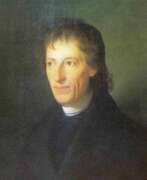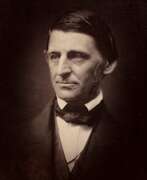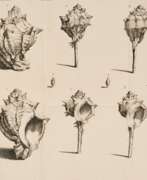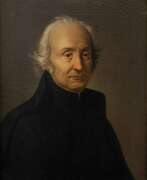Theologians 19th century


Bernard Bolzano, full name Bernard Placidus Johann Nepomuk Bolzano, was an Italian-born Czech scientist, mathematician, logician, philosopher and theologian.
Bolzano graduated from the University of Prague and was immediately appointed professor of philosophy and religion at the university. Within a few years, however, Bolzano had already shown himself to be a free thinker with his teachings on the social costs of militarism and the needlessness of war. He called for a complete reform of the educational, social, and economic systems that would direct the nation's interests toward peace rather than armed conflict between states. In 1819, Bolzano was expelled from the university for his beliefs and thereafter turned his full attention to works on social, religious, philosophical, and mathematical issues.
Bolzano held advanced views on logic, mathematical quantities, limits, and continuity. He is the author of the first rigorous theory of real numbers and one of the founders of set theory. In his studies of the physical aspects of force, space, and time, he proposed theories opposed to those advanced by the German philosopher Immanuel Kant. His contributions to logic, in particular, established his reputation as the greatest logician of his time. Much of his work remained unpublished during his lifetime and was not widely disseminated until the late nineteenth and early twentieth centuries, when a number of his conclusions were reached independently.
Bolzano was multi-talented in various fields of science to which he made significant contributions. His published works include The Binomial Theorem (1816), A Purely Analytic Proof (1817), The Functional Model and the Scientific Model (1834), An Attempt at a New Statement of Logic (1837), and The Paradoxes of Infinity (1851).
Among other things, Bolzano was also a great philanthropist. Together with his friends and students, he supported the activities of almshouses, homes for the blind, loan banks for the working class, libraries, and elementary schools in rural areas.


Ralph Waldo Emerson was an American philosopher, lecturer and poet, one of the most prominent thinkers and writers in the United States, and the originator of transcendentalism.
Ralph studied at Boston State Latin School and then at Harvard College (later Harvard University), began to preach, but soon doubted his chosen path and resigned his ministry. Emerson went to Europe, where new acquaintances and knowledge led him to new thoughts, and, returning to the United States in 1833, he began writing his famous book "Nature", where he first formulated a philosophy called transcendentalism. Soon other thinkers rallied around him, forming a group of like-minded thinkers.
In the essay "Nature," published in 1836, and in the following works, "The American Scholar" and "An Address in the School of Theology," Emerson consistently developed his ideas. Emerson's doctrine of the self-sufficiency and self-reliance of the individual stems from his view that a person need only look into his own heart to receive the spiritual guidance that has hitherto been the prerogative of the official churches. One must then have the courage to be oneself and trust the inner power within oneself, living one's life according to the commandments one has intuitively derived. These thoughts are not new, but Emerson put them in imaginative and accessible language.
Emerson's speeches led to his being ostracized at Harvard for many years. However, the informal Transcendental Club, founded in 1836, was joined and supported by his young students. The world fame of the brilliant thinker Emerson brought his "Essays" in two volumes, published in 1841 and 1844. As the main representative of transcendentalism, Emerson gave direction to the religious, philosophical and ethical movement, which above all emphasized belief in the spiritual potential of each person.
A later work of confession, The Conduct of Life (1860), demonstrates the author's developed humanism and full awareness of human limitations. The voluminous collection of poems cemented Emerson's reputation as a major American poet.


Giovanni Vincenzo Petrini was an Italian priest and theologian, philosopher, mathematician, and expert in mineralogy.
Along with Scipio Breislacus, Petrini was one of the founders of Italian volcanology. He taught philosophy and mathematics, theology, but specialized in mineralogy and created the Mineralogical Cabinet in Nazareth. This museum was famous in Europe and was visited, among others, by Emperor Joseph II, who gave him rare specimens from the lands of the Empire and especially from Hungary.
Giovanni Petrini was the author of the catalog Gabinetto mineralogico del Collegio Nazareno ("The Mineralogical Cabinet of the Nazarene Collegium, described by external features and distributed by component parts" (Rome, 1791-1792). The specimens in it are classified according to a standard structure: salts, earths, bitumens, combustibles, and metals. There is also a section on gemstones.


Giuseppe Piazzi was an Italian astronomer, mathematician and priest.
Around 1764 Piazzi became a Theatine priest, in 1779 he was appointed professor of theology in Rome, and in 1780 - professor of higher mathematics at the Academy of Palermo. Later, with the assistance of the Viceroy of Sicily, he founded an observatory in Palermo. There he compiled his great catalog of the positions of 7,646 stars and showed that most stars move relative to the Sun. There, on January 1, 1801, Piazzi also discovered the asteroid Ceres.
Giuseppe Piazzi's merits were appreciated: he was a member of the Royal Society of London, a foreign honorary member of the St. Petersburg Academy of Sciences and a foreign member of the Paris Academy of Sciences. A crater on the Moon is named in his honor.